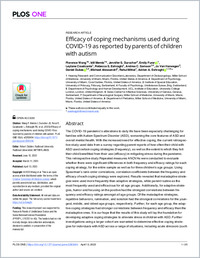Efficacy of coping mechanisms used during COVID-19 as reported by parents of children with autism
IPC
- Wang, Florence Hearing Research and Communication Disorders Laboratory, Department of Otolaryngology, Miller School of Medicine, University of Miami, Miami, Florida, United States of America
- Memis, Idil Hearing Research and Communication Disorders Laboratory, Department of Otolaryngology, Miller School of Medicine, University of Miami, Miami, Florida, United States of America
- Durocher, Jennifer S. Department of Psychology, University of Miami, Coral Gables, Florida, United States of America
- Furar, Emily ORCID Hearing Research and Communication Disorders Laboratory, Department of Otolaryngology, Miller School of Medicine, University of Miami, Miami, Florida, United States of America
- Cavalcante, Leylane Hearing Research and Communication Disorders Laboratory, Department of Otolaryngology, Miller School of Medicine, University of Miami, Miami, Florida, United States of America
- Eshraghi, Rebecca S. Hearing Research and Communication Disorders Laboratory, Department of Otolaryngology, Miller School of Medicine, University of Miami, Miami, Florida, United States of America
- Samson, Andrea C. Institute of Special Education, University of Fribourg, Fribourg, Switzerland. Faculty of Psychology, Unidistance Suisse, Brig, Switzerland
- Van Herwegen, Jo Department of Psychology and Human Development, UCL, Institute of Education, University College London, London, United Kingdom
- Dukes, Daniel ORCID Institute of Special Education, University of Fribourg, Fribourg, Switzerland. Swiss Center for Affective Sciences, University of Geneva, Geneva, Switzerland
- Alessandri, Michael Department of Psychology, University of Miami, Coral Gables, Florida, United States of America
- Mittal, Rahul Hearing Research and Communication Disorders Laboratory, Department of Otolaryngology, Miller School of Medicine, University of Miami, Miami, Florida, United States of America
- Eshraghi, Adrien A. ORCID Hearing Research and Communication Disorders Laboratory, Department of Otolaryngology, Miller School of Medicine, University of Miami, Miami, Florida, United States of America. Department of Neurological Surgery, Miller School of Medicine, University of Miami, Miami, Florida, United States of America. Department of Pediatrics, Miller School of Medicine, University of Miami, Miami, Florida, United States of America
- 13.04.2023
Published in:
- PLOS ONE / Didden, Robert. - Public Library of Science (PLoS). - 2023, vol. 18, no. 4, p. e0283494
English
The COVID-19 pandemic’s alterations to daily life have been especially challenging for families with Autism Spectrum Disorder (ASD), worsening the core features of ASD and overall mental health. With the increased need for effective coping, the current retrospective study used data from a survey regarding parent reports of how often their child with ASD used certain coping strategies (frequency), as well as the extent to which they felt their child benefitted from their use (efficacy) in mitigating stress during the pandemic. This retrospective study Repeated measures ANOVAs were conducted to evaluate whether there were significant differences in both frequency and efficacy ratings for each coping strategy, for the entire sample as well as for three children’s age groups. Using Spearman’s rank-order correlations, correlation coefficients between the frequency and efficacy of each coping strategy were explored. Results revealed that maladaptive strategies were used more frequently than adaptive strategies, while parent routine as the most frequently used and efficacious for all age groups. Additionally, for adaptive strategies,
humor and focusing on the positive had the strongest correlations between frequency and efficacy ratings amongst all age groups. Of the maladaptive strategies, repetitive behaviors, rumination, and isolation had the strongest correlations for the youngest,
middle, and oldest age groups, respectively. Further, for each age group, the adaptive coping strategies had stronger correlations between frequency and efficacy than the maladaptive ones. It is our hope that the results of this study will lay the foundation for
developing adaptive coping strategies to alleviate stress in children with ASD. Further investigations using a larger cohort are warranted to determine effective coping strategies for individuals with ASD across a range of situations, including acute stressors (such as future public health emergencies and natural disasters), as well as common daily stressors.
humor and focusing on the positive had the strongest correlations between frequency and efficacy ratings amongst all age groups. Of the maladaptive strategies, repetitive behaviors, rumination, and isolation had the strongest correlations for the youngest,
middle, and oldest age groups, respectively. Further, for each age group, the adaptive coping strategies had stronger correlations between frequency and efficacy than the maladaptive ones. It is our hope that the results of this study will lay the foundation for
developing adaptive coping strategies to alleviate stress in children with ASD. Further investigations using a larger cohort are warranted to determine effective coping strategies for individuals with ASD across a range of situations, including acute stressors (such as future public health emergencies and natural disasters), as well as common daily stressors.
- Faculty
- Faculté des lettres et des sciences humaines
- Department
- Département de Pédagogie spécialisée
- Language
-
- English
- License
- Open access status
- gold
- Identifiers
-
- DOI 10.1371/journal.pone.0283494
- ISSN 1932-6203
- Persistent URL
- https://folia.unifr.ch/unifr/documents/324882
Statistics
Document views: 58
File downloads:
- wangetal.2023.efficacyofcopingmechanismsusedduringcovid-19..: 67
